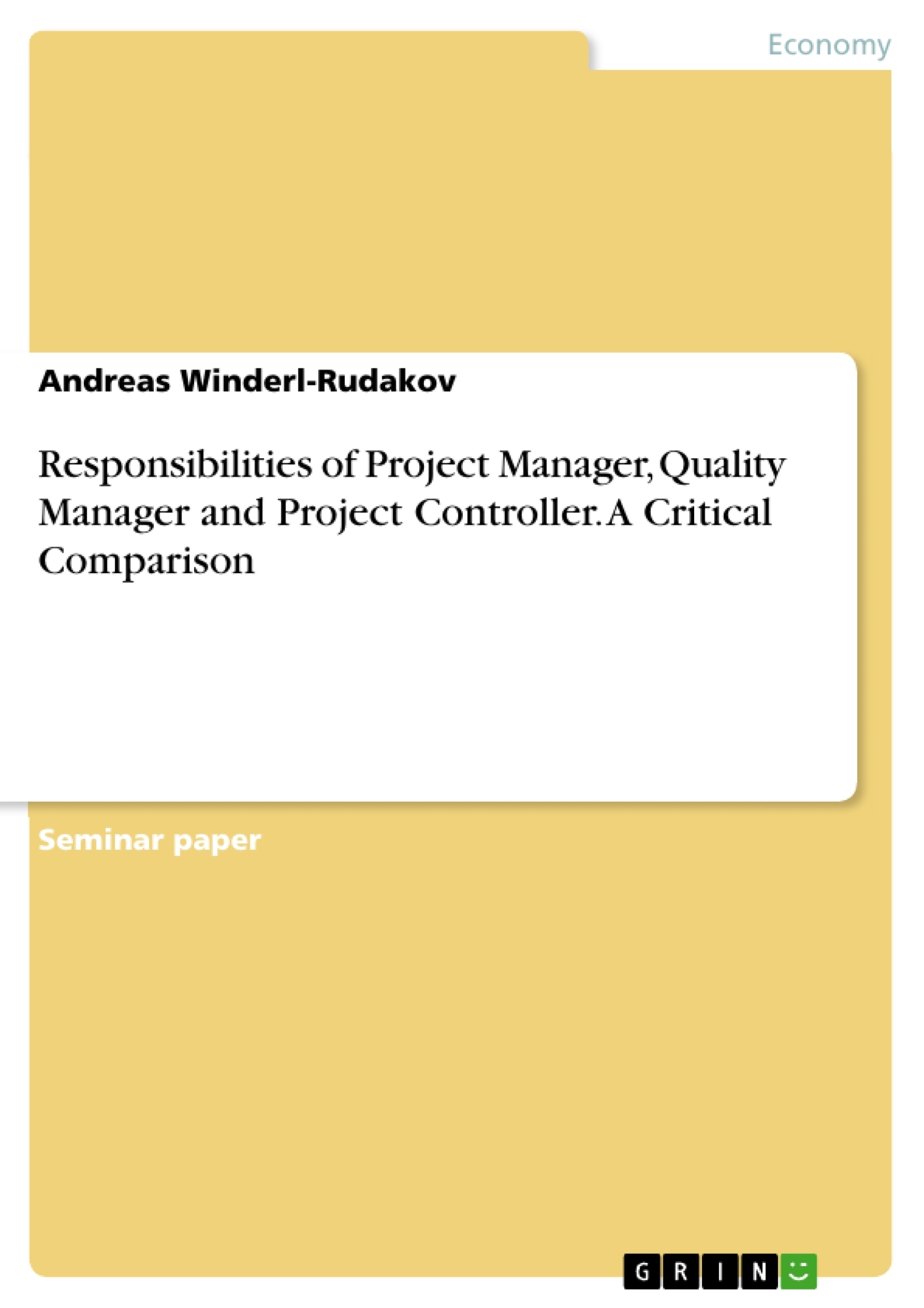As project management includes also the tasks of project controlling and quality
management, in large projects these tasks are often assigned to other individuals
than the project manager. This may be also the case if the project manager has no affinity to numbers, given a more technical background or education. The scope of this work is to clarify the responsibilities of the project manager, the project controller and the Quality Manager. Furthermore an analysis and comparison is necessary to determine, if the tasks and responsibilities are clearly defined, delimitated and assigned. This will identify, if there are overlapping areas of responsibility, if there occurs conflict potential within the project team, and which success criteria are necessary to reduce it.
Inhaltsverzeichnis (Table of Contents)
- Responsibilities of Project Manager, Quality Manager and Project Controller - a Critical Comparison
- Introduction
- History
- Scope of Work
- Structure of Work
- Definitions
- Project Management
- Project Manager
- Quality Manager
- Project Controller
- Success Criteria
- Critical Comparison
- Conclusion
Zielsetzung und Themenschwerpunkte (Objectives and Key Themes)
This paper aims to critically compare the responsibilities of a Project Manager, Quality Manager, and Project Controller. It explores the historical development of project management and defines the roles of each position. The analysis will identify overlapping areas of responsibility and highlight key differences in their functions within a project.
- Historical development of project management
- Definitions and roles of Project Manager, Quality Manager, and Project Controller
- Overlapping responsibilities of the three roles
- Key differences in the functions of each role
- Success criteria for project management
Zusammenfassung der Kapitel (Chapter Summaries)
Introduction: This chapter introduces the increasing importance and prevalence of project management in recent decades, citing the rise in publications, training programs, and online searches related to the field. It then delves into a brief history of project management, tracing its origins back thousands of years to ancient Mesopotamia and Egypt, highlighting significant projects like the Ziggurat of Ur and the Giza pyramids. The chapter discusses the evolution of project management from being led by experienced engineers and architects to the emergence of a separate profession in the late 1950s, culminating in the founding of the Project Management Institute (PMI) in 1969 to promote professionalism in the field. The historical overview lays the groundwork for understanding the modern context of project management and the roles examined in the subsequent chapters.
Definitions: This section provides clear definitions of key terms crucial to the paper's central comparison. It formally defines "Project Management," laying out its core principles and objectives. Following this, it meticulously defines the roles of "Project Manager," "Quality Manager," and "Project Controller," detailing their respective responsibilities and areas of expertise. Each definition is presented with precision and clarity, distinguishing the specific contributions and accountability of each role within the project lifecycle. This detailed explanation forms the foundation for the comparative analysis that will follow, ensuring a common understanding of the terms used throughout the paper.
Schlüsselwörter (Keywords)
Project Management, Project Manager, Quality Manager, Project Controller, PMI, responsibilities, critical comparison, project success, historical development.
Frequently Asked Questions: Responsibilities of Project Manager, Quality Manager and Project Controller - a Critical Comparison
What is the overall purpose of this document?
This document provides a comprehensive overview of the roles and responsibilities of a Project Manager, Quality Manager, and Project Controller. It aims to critically compare these roles, highlighting both overlapping areas and key differences in their functions within a project.
What topics are covered in the document's table of contents?
The table of contents includes an introduction, definitions of key roles (Project Manager, Quality Manager, Project Controller), success criteria, a critical comparison of the roles, and a conclusion. The introduction itself covers the history and scope of project management.
What are the key objectives and themes explored in the document?
The main objectives are to define the roles of Project Manager, Quality Manager, and Project Controller; to compare their responsibilities; and to identify key differences and overlaps in their functions. Key themes include the historical development of project management, the specific responsibilities of each role, and the criteria for project success.
What does the introduction chapter cover?
The introduction discusses the growing importance of project management, tracing its history from ancient civilizations (Mesopotamia and Egypt) to the modern era, including the founding of the Project Management Institute (PMI). It sets the context for understanding the modern roles within project management.
What is included in the "Definitions" chapter?
This chapter provides precise definitions of "Project Management," "Project Manager," "Quality Manager," and "Project Controller," clarifying their respective responsibilities and areas of expertise. This lays the groundwork for the comparative analysis in later sections.
What are the key words associated with this document?
Key words include: Project Management, Project Manager, Quality Manager, Project Controller, PMI, responsibilities, critical comparison, project success, historical development.
Where can I find chapter summaries?
The document includes summaries of the Introduction and Definitions chapters, providing a concise overview of the content of each.
What is the overall approach to comparing the three roles?
The document uses a critical comparison approach, analyzing both the overlapping responsibilities and the key differences between the roles of Project Manager, Quality Manager, and Project Controller to provide a comprehensive understanding of their individual contributions to a project's success.
- Quote paper
- Andreas Winderl-Rudakov (Author), 2012, Responsibilities of Project Manager, Quality Manager and Project Controller. A Critical Comparison, Munich, GRIN Verlag, https://www.grin.com/document/265088



